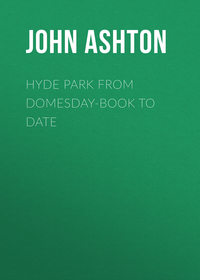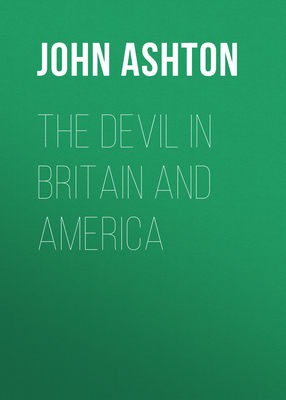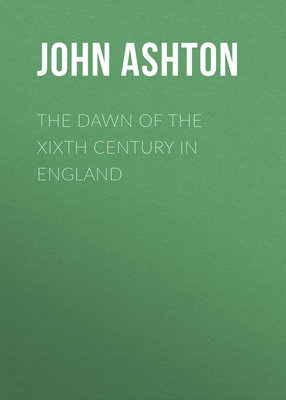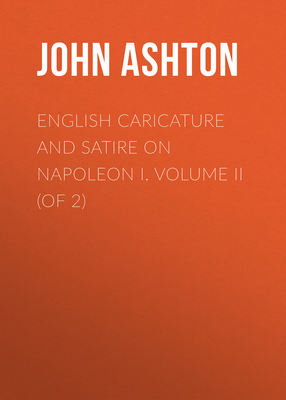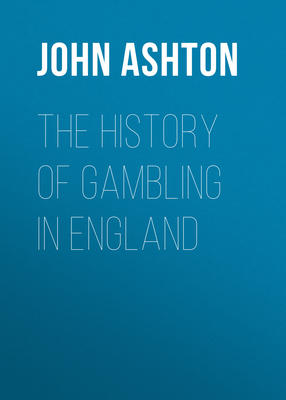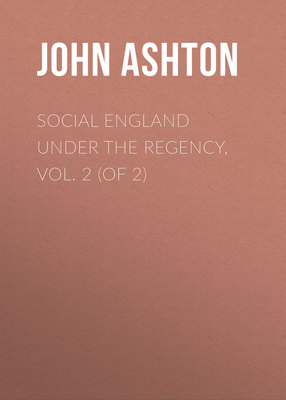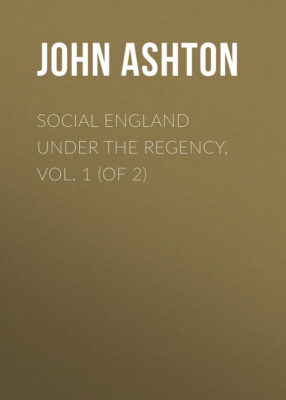Kitabı oku: «Hyde Park from Domesday-book to Date», sayfa 12
Mr. Beales was, not long after, made a County Court Judge.
On 19th April, 1867, there was a meeting, convened by the “Working Men’s Rights Association,” held in Hyde Park, for the purpose of denouncing the Government Reform Bill, and to express their opinion “That the Parks are the People’s, and we hereby claim the right to the use of them for the purpose of discussing our political wrongs.” They had a red flag, surmounted by a Cap of Liberty, but, as they were quiet, the police did not interfere with their proceedings, although there was a reserve of mounted and foot police at the Magazine, to act in case their services were required.
On 17th April, 1867, it was resolved, at a meeting of the Council and delegates of the various branches of the Reform League, “That a demonstration of the Reformers of London be held in Hyde Park at 6 o’clock in the evening of Monday, the 6th of May.” This provoked much comment from the inhabitants of the neighbourhood, and from those who looked upon the Park as a place of recreation and innocent enjoyment; and on 1st May Mr. Walpole issued the following proclamation: —
“Whereas it has been publicly announced that a meeting will be held in Hyde Park on Monday, the 6th of May, for the purpose of political discussion; And whereas the use of the park for the purpose of holding such meeting is not permitted, and interferes with the object for which her Majesty has been pleased to open the Park for the general enjoyment of her people: Now all persons are hereby warned and admonished to abstain from attending, aiding, or taking part in any such meeting, or from entering the park with a view to attend, aid, or take part in such meeting.”
This was received with ridicule by some of the meeting, and Col. Dickson elegantly pointed out that it was a very milk-and-watery affair, and showed that there was some “funking” in official quarters; and Mr. Bradlaugh moved a resolution which, somewhat altered in words, was carried unanimously: “That this meeting, denying the right of S. H. Walpole, or any other person in this realm, to issue such a proclamation, and, regarding the parks as places open for the purpose of holding public meetings, which are the right of all Englishmen, reply to the proclamation, that they intend holding the meeting of Monday, and that the consequences of endeavouring to prevent it must rest with those who are wicked enough to take this course.”
Men’s minds were much exercised as to this meeting. Petitions, signed by upwards of 16,000 persons in the metropolis against the proposed demonstration in the Park, were presented to Mr. Walpole; and the question of the law on the subject was authoritatively laid down; which was, that in November, 1856, the law advisers of the Crown – Sir Alexander Cockburn, Sir Richard Bethell, and Mr. (afterwards Justice) Willes – signed an opinion to the effect that there is a right to close the gates and exclude the public: or, the gates being open, to exclude persons; but that persons who have once entered, cannot be turned out without notice that the license is withdrawn.
In July, 1866, this opinion was submitted to Sir William Bovill and Sir Hugh (afterwards Earl) Cairns, who were particularly requested to say whether there was any legal authority to disperse by force any meeting for political purposes in the Park.
Their answer was, that there is no such authority for any practical purpose.
They stated that when persons had once entered the Park, they could only be ejected after notice being served on, or brought home to each individually. Publication, they said, is not enough, for many cannot, and many would not read, and an express warning must be shown. They particularly impressed that the right of removal is a separate right against each individual who has had notice. No force, therefore, can be brought to bear against bodies, or masses, which may contain many who have not had notice. They also said that it would not be practicable to remove any number, individually, and prevent them from returning, and remarked on the probability of disorder, if even an individual were turned out. The effect, consequently, was that the Government had nothing but the common law of trespass to rely upon.
The Government, however, relied upon the strong arm; and on May 6th special constables were sworn in in different parts of London, whilst the several police magistrates were in attendance at their Courts for a like purpose. The public were officially warned that a force of over 5000 mounted and foot police would be in the Park, as well as Sir Thomas Henry, the Chief Magistrate, upon whose word would rest the employment of troops, who were, for that day, confined to barracks, in order to be in readiness at a moment’s notice. But the futility of guarding the railings and hoardings of the whole Park was so forcible that it was determined not to attempt to keep anybody out; and, at the last moment, it was decided to permit the demonstration, and not to interfere with it, so long as the peace was preserved.
Well, the day came, and so did the people, in their thousands, until it was reckoned that there were about 30,000 present; and soon after six the speechifying began. And when that was over, the people dispersed without the slightest disturbance worth mentioning, or without more than a dozen policemen being, at any one time, seen upon the ground. The Times of May 7th thus winds up its account of the meeting:
“At a little before 8 o’clock most of the meetings began to disperse, and the crowd to quit the Park, in a quiet and orderly manner. In some cases, where the stations were quitted early, speakers not named in the programme took the places of the official orators, and held forth for a time; but the interest had died away, and none could retain their audiences long, even where, in one case, the speaker was a lady, and declaimed, with singular vehemence, about the rights of women. As the crowd from one of the stations was leaving, one of the reformers seized a pickpocket, who had taken a gentleman’s watch, and who succeeded in passing it away to a confederate, in an instant. Others of the same gang made an effort to rescue the prisoner; but, with the aid of some detectives, who instantly came up, he was forced along in the direction of the police barracks. Thither an immense crowd followed, which, passing in through the narrow, funnel-shaped entrance, between walls, made, for a time, a crowd so dense, that it seemed as if some lamentable result would ensue. Yet the reformer and the detectives stuck to their prisoner, and the great mass of the concourse around them most earnestly cheered them in their endeavour to secure him. When at length he was forced through the pressure of the mass into the station, great cheers and clapping of hands arose on all sides at the success of the capture, and those who at first had attempted to rescue the prisoner at once slunk away. After this nothing worth notice occurred. Only five prisoners were apprehended, three for picking pockets, and two for gambling.
“At ten o’clock the police and military were withdrawn; at eleven the Park was quite clear, and all the streets adjoining even emptier than usual. No accident of any kind took place, as far as the police were able to ascertain.”
The Reform League had not done with Hyde Park yet awhile. On July 31, 1867, it issued the following poster and handbill: – “Reform League. ‘To your tents, Oh! Israel.’ – A monster meeting of the working men and other inhabitants of the metropolis will be held in Hyde Park, on Monday evening next, August 5th, at 7 o’clock, under the presidency of the Reform League, to express the public indignation at the Parks Prohibition Bill, attempted to be passed through an expiring and self-condemned Parliament, by the enemies of all popular rights; and also to protest against the attempt of the House of Lords to rob the lodger of his franchise.”
The meeting duly took place, and passed away without event. The League was on its last legs. As The Times observed, – “Yesterday, however, the League put forth its strength for a final effort, but sad to say, it failed egregiously. It made a grand effort of despair, but it lacked the strengthening impulse which that feeling ordinarily instils. A dull, lethargic passiveness pervaded every movement of the demonstration.”
CHAPTER XIX
Demonstrations against the Irish Church, 1868 – In favour of Fenians, 1869 – Regulations made by Commissioners of Works – Fenian Demonstration, 1872 – A speaker sentenced – Meeting about the Eastern Question, 1878 – Fight – Preaching in the Park – Modern instances – May-Day and May 6, 1894 – Against the House of Lords, Aug. 26, 1894.
On Sunday, July 19, 1868, there was a demonstration in the Park against the Irish Church: then there was one in favour of the Fenians in Oct., 1869. But it is not worth chronicling all the meetings that have taken place since the time when the Commissioners of Works settled upon the place of public meetings, and the routine necessary before they were held.
Times, Oct. 15, 1872: “The Commissioners of Works have caused to be erected in Hyde Park, at exactly 150 yards distance from the so-called ‘Reformers’ Tree,’52 a granite pedestal and iron standard, surmounted by a board, to mark the spot where it shall be lawful (and there only) to hold public meetings, and inscribed with the following announcement: ‘The Notice Board respecting Public Addresses. – No public address may be delivered except within 40 yards of the notice board on which this rule is inscribed.’ The rule is to the following effect, and in addition, posted at all the entrances to the Park: ‘No public address may be delivered unless a written notice of the intention to deliver the same, signed with the names and addresses of two householders residing in the metropolis, be left at the offices of Her Majesty’s Works and Public Buildings, at least two clear days before: such notice must state the day and hour of intended delivery. After such notice has been received, no other notice for the delivery of an address on the same day will be valid.’ ”
Because the concession had been made, of course it was forthwith to be set at nought – by a Fenian Demonstration. The following is the commencement of an account of the meeting in The Standard of Nov. 4, 1872.
“The late Mr. O’Connell was in the habit of boasting that he could drive a coach-and-four through an Act of Parliament. The sympathizers with political discontent, or disturbance rather, in London, transcended the rhetorical flourish of the agitator, par excellence, yesterday. They had been bragging at Convention for some time past that they would hold a meeting in Hyde Park, ‘the people’s Park,’ in the teeth of Mr. Ayrton and the Parks Regulation Bill,53 and yesterday they carried out their threat. The day was the day consecrated to God’s worship, but these disciples of ‘the revolution’ held their demonstration all the same, evidently acting on the principle of the proverb ‘the better the day, the better the deed.’ The object of the gathering was to seek for the amnesty of the political prisoners (by political prisoners being understood sundry soldiers who had forsworn their allegiance to join a conspiracy against the Queen’s Government, and the lives of their own comrades), and various other culprits who, under the pretence of patriotism, had transgressed the laws that regulate the order of the community by acts of violence.”
This led to twelve of the speakers being summoned to Marlborough Street Police Court, and one of them, a man named Bailey, was tried before the magistrate as a test of the whole, on Nov. 19, and fined 5l. or a month’s imprisonment, but it was agreed that a case should be stated, and taken to a higher Court, the other summonses being adjourned sine die. The Appeal came on at the Queen’s Bench, on Jan. 23, 1873, before three judges, who all concurred in affirming the conviction. The Treasury, to the very great disgust of the Fenian sympathizers, presented them with a bill of costs for 100l., but I do not know whether it was ever paid.
The effect of licensing public meetings in Hyde Park has been to turn that place into a bear-garden on most Sundays during fine weather, and one-sided meetings, more or less orderly, have been held on almost every subject, social and political. Is there a strike, the strikers must needs go and bellow their grievances – be they cabmen, laundresses, bakers, or unemployed. What good they think can accrue from it, they themselves cannot answer. As to the Trades’ Unions who go there periodically, I fancy very few would go were it not to show their regalia, air their banners, and march to the sound of a brass band; while of late years it has become to very many a Sunday picnic, to which they and their wives go in brakes. Nay, sometimes they meddle with things wholly out of their sphere; as, for instance, the demonstration on the Eastern Question on Feb. 24, 1878, at which the following handbill was distributed: —
“Russian Meeting in Hyde Park: – Englishmen! A last attempt is to be made by the baffled agents of Russia, on Sunday, Feb. 24 (to-day), to corrupt and undermine the patriotism of our countrymen. Do you wish Count Schouvaloff to telegraph to the Czar that any meeting of Englishmen have passed resolutions in favour of the policy of the most despotic and cruel Power in Europe, a Power that deliberately crushes all ‘national freedom’ with the iron heel of military force, and shuts out British industry from all her territories? Any resolution passed at their meeting will be a direct encouragement to Russia. Nothing but a vigorous and determined policy will prevent war, which the Russian party, if successful, will inevitably bring about, as they brought about the Crimean War, in 1853.”
While Mr. Auberon Herbert was speaking, The Times says that “A rush was made by a number of well-dressed young men on the south-east, at the same time that a huge column, with banners spread, was advancing from the north-east. It was easy to see that the ‘specials’ in the ring had had no military training, for some left the part which needed the most strength to repel the attack made by the young men. The chairman and the clergyman disappeared, and the Peace party then stood ready to greet the on-coming column. Mr. Bradlaugh had a special constable’s staff in his hand; and, parleying with the head of the column, demanded that their flags should be put down. Each of the men who had composed the circle brought out a constable’s staff. The platform was, meanwhile, left in the possession of one person. The Peace party tore down the Turkish and Polish banners from the poles, and thereupon the anti-Russian party made a rush to, and broke up the platform.
“The mélée now became almost general, for all classes of persons had got mixed up together, and in the struggle of those who wanted to pass out of harm’s way, an extraordinary scene was presented. There must have been 60,000 or 70,000 people, but only a very small number was inclined to take active part in the proceedings. The fight, which was more noisy than hurtful, did not occupy much time. One or two men climbed small trees, where they took up the remains of the Turkish flag, and displayed it upon the leafless branches. It was draped too low, however, and was seized and lost. One of the events of the day was a regular fight in a tree, between two well-matched antagonists. The fight was witnessed by the whole crowd, some of whom took it upon themselves to dislodge the fellows from the trees, by pelting them with heavy sticks and stones.”
But public meetings were not the only nuisance occasioned by throwing open the Park. It at once became a place for every shade of religious and secular doctrine to be preached; and the first notice I can find of these practices is in a letter in The Times of Nov. 27, 1872.
“The public are not aware of what occurs on Sundays in Hyde Park. Here is what I have seen.
“A man dressed as a clergyman was standing on a seat near the Serpentine, and preaching to a few listeners, a very sensible sermon. A policeman advanced and told him, ‘This is not allowed.’ The preacher at once discontinued. Scene the second. A considerable crowd near what is called the Reformers’ Tree: three men, dressed in cassocks and caps, preaching such terrible blasphemy that I quite shuddered to hear it, our Saviour’s name and His words being travestied in the most awful and obscene manner. The policeman there stood outside the crowd, but made no attempt to interfere.”
Are things better now? Let anyone go and see for himself; or, if that is inconvenient or impossible, let him read these two recent newspaper cuttings (Globe, April 16, 1894): —
“Disorderly Scene in Hyde Park
“Yesterday afternoon a disorderly scene took place in Hyde Park. Two persons who were endeavouring to hold a religious meeting near the Serpentine, were surrounded by a crowd of men and boys, and, owing to some peculiarity, were frequently interrupted and prevented from proceeding with the service they were attempting to conduct. Finally, the opposition became so demonstrative that the two men were compelled to beat a retreat, a small banner they had with them being torn. Their hats were knocked off, and they were otherwise subjected to considerable hustling and ill-usage. Some disorder also occurred at a meeting which was being held close by. Scenes of this character have recently become very common in the Park.”
“The Bishop of Hyde Park
“At the Marlborough Street Police Court, John Mullane, thirty-seven, labourer, Circus Street, Marylebone; John Hayes, twenty-three, painter, John Street, Marylebone; and John Henlay, thirty, labourer, Carlisle Street, Marylebone; were charged with fighting together in Hyde Park. A police sergeant said that on Sunday evening, a man named Scully was addressing a meeting in Hyde Park, close to the Marble Arch. Presently, the three prisoners began to fight with each other, apparently over some argument with Scully. To prevent further disturbance, he obtained assistance, and took the men into custody.
“In defence, Mullane said he was listening to Scully, and noticed that he had a bottle in his pocket. Scully said it was water, but Hayes smelt it, and said it was gin. Then Scully knocked him (Hayes) down. He (Mullane) then struck Scully, when Henlay came up and struck him (Mullane) and knocked him down. Henlay said that he was standing behind Scully, when Hayes took the bottle out of his (Scully’s) pocket, struck Scully, and threw him on the top of him (Henlay). Peter Scully deposed that he lived in Stanhope Street, Deptford, and got a living by selling ‘good’ books. He had been in the habit of lecturing in Hyde Park, in favour of religion, for the last twelve years. While he was speaking on Sunday night, a bottle of water was pulled away from him, his hand was cut, and his chair was pulled from under him. People called him the ‘Bishop’ of Hyde Park, because he had such large audiences. He saw two young fellows struck.
“Mr. Newton: ‘You see all these disturbances are caused by your preaching.’ – Scully: ‘I cannot help that.’ – Mr. Newton: ‘Yes, you can, because you need not preach there.’ – Scully: ‘Many other persons speak there as well as myself, and if I should stop speaking there, the other speakers should do the same.’ – Mr. Newton: ‘I think it would be a good thing if all of them were stopped. If there were no speakers in the Park, there would be no fights.’ – Scully: ‘I should not mind if speaking in the Park were stopped, for I can always get an audience, and could address meetings elsewhere.’ – Mr. Newton (addressing the defendants) said, they ‘should not misbehave themselves in the Park,’ and ordered them to enter into their own recognizances to be of good behaviour in the future.” —Daily Graphic, May 1st, 1894.
Here, also, in the Park, men’s minds are poisoned by the doctrines of Socialist and Anarchist; but the latter, at present, is somewhat out of favour with King [Greek: dêmos] – probably on account of the Anarchist predilection for bombs, against which even his majesty is not proof. Here is an account from the Daily Graphic of last
“May Day in Hyde Park
“The May Day celebration in London has been marked by one of the most extraordinary scenes ever witnessed in Hyde Park. The occasion was a demonstration organized by the Social Democratic Federation to unite with the demonstrations on the Continent in making the first of May Labour Day. There was, of course, a procession, which formed up on the Embankment, and was about as imposing as that which follows a drunken man to the police-station.
“There was the difference that it had a few waggonettes and greengrocers’ carts to lengthen it out. Some of the waggonettes and the greengrocers’ carts were arched in with green branches, and the drivers wore red caps of the sort usually associated with burlesque. They were understood to represent ‘caps of liberty.’ A few bakers’ carts displayed specimens of French loaves and horseshoe rolls. In some of the carts were children who sang the ‘Marseillaise,’ as the carts trailed through Piccadilly. Girls of an older growth had donned white dresses trimmed with a virulent red, and marshalled the younger ones. Mr. Keir Hardie, with his tweed cap and his pipe, walked through the crowd like one who expected the homage due to a hero. Mr. William Morris was also there, but one could not help thinking that he was, and felt, out of place. There were speeches, of course. These were laudatory, for the most part, of the workers and the Social Democratic Federation.
“But the Anarchists had, somehow, recovered their spirits, and had ventured to join in the procession. Agnes Henry, in her inevitable yellow ulster and cloth shoes, plodded indefatigably on the outskirts of the crowd. Louise Michel hovered here and there. They had their flags – red with black fringes – with them. One was an imposing banner on two poles, with an appeal to put down all government and authority. The Anarchists took up their position as side shows to the main demonstration. The crowd had paid no attention to the Social Democrats, but the Anarchists drew them like a magnet. A man, named Leggatt, a well known anarchist, declaimed from one platform; a succession of speakers, including Louise Michel, Mowbray, Dr Macdonald, and others, from another, which was intended to be more important. Sullivan, of Tower Hill fame, had a little show of his own. There was an evident desire to listen to the Anarchists patiently at first. Then the listeners had their feelings jarred by some outrageous exposition of the doctrine of explosives. They groaned and hooted. Leggatt, with clumsy retort, said they should be at a Board School, or playing marbles. So far as he was concerned, the result was disastrous. There was a spring at him, and he swayed for a moment on his perch, and then came down full length, while his platform was soon in little bits. The police, who had been observing the ugly temper of the crowd, rushed in, just in time to save him from worse injury. The banner was promptly in ribbons, and its pole was broken up. On this the people at the other platform discreetly folded their banner, and took it away.
“They would have done as well to have taken themselves away also. One man, whose vanity shall not be gratified by having his name mentioned here, said the police were keeping down the workers. ‘You will never be free while you have such men as Melville.’54 He was answered with a cheer for the police, and, in a second more, was in the hands of the crowd. There were cries of ‘In the Serp. with him,’ and again Chief-Inspector Peters and his men had to rush in to save the demonstrators from the consequences of their own folly. A red tie became a dangerous article of adornment – there were threats to lynch the wearers. It was now becoming more and more difficult to keep the crowd in hand. Big as the A.R. division men are, they could hardly force their way through the dense masses.
“Never has there been such a scene in the Park. Racing across it came the hunted Anarchists, surrounded by a yelling, fist-using crowd, with the police protecting, as well as they could, the objects of the public wrath. At the Marble Arch, the police formed a cordon across the gates and closed all passage, and it was then only that the Anarchists, bleeding and bruised, were able to get into cabs and be driven to safety.”
Any one would have thought that this lesson would have lasted them some time, but it was not so. On the first Sunday in the month (6th May) the annual demonstration in favour of a “Legal Eight Hours Day” took place in Hyde Park; and, although the Anarchists had nothing whatever to do with the meeting, yet the irrepressibles were there, and succeeded in marching to their usual speaking-place near the Reformers’ Tree; but their reception by the sympathizers with the demonstration was of so hostile a character, that before the head of the procession arrived, they were hunted out of the Park, and, but for the protection afforded by the police, several would have been severely handled.
Perhaps the greatest fiasco of any of these meetings was one held Aug. 26th, 1894, with a view of abolishing the House of Lords. There were comparatively few people, the procession being made up of banners and bands.
